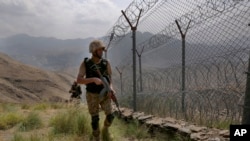A new United Nations report warns that al-Qaida has established eight new training camps in Taliban-ruled Afghanistan and is increasingly assisting anti-Pakistan militants to launch cross-border attacks.
The report said an al-Qaida camp in the Afghan border province of Kunar is "conducting suicide bomber training" to support operations of Tehrik-i-Taliban Pakistan, or TTP, a globally designated terrorist group leading attacks against Pakistani security forces.
The U.N. Analytical Support and Sanctions Monitoring Team released its findings this week, providing a fresh assessment of the threat militant groups, particularly TTP, pose to the region from their sanctuaries in Taliban-ruled Afghanistan.
Thursday, the de facto Afghan authorities rejected the U.N. findings as "false allegations."
The report noted that the Taliban’s relationship "remains strong" with senior al-Qaida leaders, particularly with the terror group’s regional affiliate, al-Qaida in the Indian Subcontinent or AQIS.
It found that the Taliban "are generally sympathetic to TTP aims" and have not responded to Pakistan's repeated requests to prevent cross-border militant violence, which last year alone killed nearly 1,000 Pakistani security forces and civilians.
"The short-term detention of 70 to 200 TTP members and the relocation of personnel northward away from the border areas by the Taliban were assessed as deflecting pressure from Pakistan to contain TTP," the report noted.
"Besides supplying weapons and equipment, Taliban rank and file, Al-Qaida core and AQIS fighters assisted TTP forces in cross-border attacks … Some Taliban members also joined TTP, perceiving a religious obligation to provide support."
TTP members and their families receive regular aid packages from the Taliban, the U.N. report said, adding that the de facto Afghan authorities reportedly provided a monthly $50,500 to TTP leader Noor Wali Mehsud.
"A notable development is the increase of Afghan nationals in the TTP ranks. Al-Qaida core and AQIS continue to provide training, ideological guidance, and support to TTP," the report said. It added that al-Qaida recently ordered all its vehicles to be "gifted" to TTP due to fear of being targeted by the United States.
The support has "strengthened and emboldened" TTP to increase attacks "with a broader degree of autonomy to maneuver." The U.N. report noted that AQIS reportedly supplied armed fighters to support a major TTP assault on security outposts in the Pakistani border district of Chitral, increasing the group’s morale.
The report said a newly emerged group, Tehrik-e-Jihad Pakistan, or TJP, is operating from Afghan territory, possibly with support from al-Qaida and providing TTP with "plausible deniability to alleviate the pressure from Pakistan on the Taliban government."
TJP has claimed responsibility for several high-profile attacks against the Pakistani military in recent months. Officials in Islamabad said some of the assailants killed by security forces involved in these attacks were Afghan nationals.
Last December, TJP militants, including suicide bombers, assaulted an army base in northwestern Khyber Pakhtunkhwa province, killing 23 soldiers and making it the deadliest raid against the Pakistan military in recent years.
The U.N. study said that several member states reported "continued proliferation of weapons from stockpiles" left by U.S.-led coalition troops after they withdrew from Afghanistan in August 2021, when the then-insurgent Taliban seized power.
"In one case Taliban commanders were reported to have provided TTP with significant quantities of weaponry, including M24 sniper rifles, M4 carbines with Trijicon ACOG scopes, and M16A4 rifles with thermal scopes," the report said.
It added that weapons and equipment, particularly night vision capability, have reportedly added "lethality to TTP attacks on Pakistani security forces."
The chief Taliban government spokesperson Thursday rejected as propaganda the U.N. report about the presence of al-Qaida camps or allegations that Kabul is providing support to militant groups.
"There is no one related to al-Qaeda in Afghanistan, nor does the Islamic Emirate allow anyone to use the territory of Afghanistan against others," Zabihullah Mujahid said in a statement.
Mujahid previously also refuted Pakistani allegations that his government is allowing TTP to conduct cross-border attacks.
"We will not allow anyone to use the soil of Afghanistan against Pakistan. However, it is not our responsibility to prevent and control attacks inside the territory of Pakistan," the Taliban spokesperson said in a recent statement.
TTP is known to have provided recruits and sheltered Taliban leaders on Pakistani soil while they directed insurgent attacks against U.S.-led international forces in Afghanistan for years.
The group moved its command-and-control operations to Afghan border areas after the Taliban takeover and is conducting attacks with greater operational freedom from there, according to Pakistani officials.
VOA U.N. correspondent Margaret Besheer contributed to this report.











